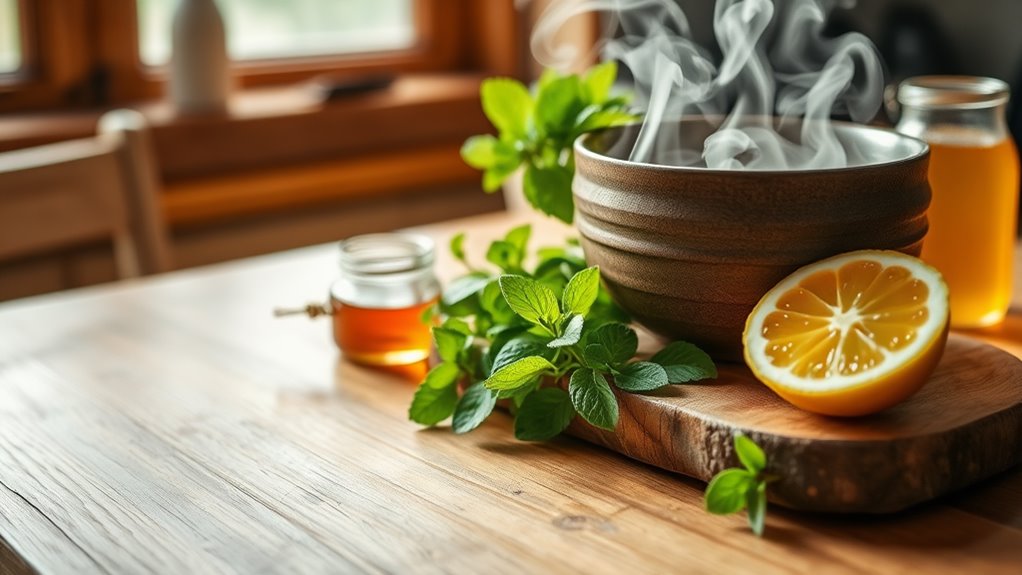Clear a Stuffy Nose Naturally With This Easy DIY
To clear a stuffy nose naturally, try steam inhalation by breathing in steam from hot water for 10-15 minutes. You can enhance this by adding eucalyptus or peppermint essential oils. Another effective method is a saline nasal rinse made from distilled water, non-iodized salt, and baking soda. Staying hydrated also helps thin mucus, and using a humidifier can soothe dry nasal passages. There are more DIY techniques you might find beneficial for quick relief.
Key Takeaways
- Use steam inhalation by leaning over hot water, covering your head with a towel, and breathing deeply for 10-15 minutes.
- Create a saline nasal rinse with distilled water, non-iodized salt, and baking soda to thin mucus and flush allergens.
- Apply a hot compress to your nose and forehead to reduce inflammation and relieve pressure in your sinuses.
- Stay hydrated by drinking water and herbal teas to thin mucus and support your immune system.
- Utilize essential oils like eucalyptus or peppermint in a diffuser or hot water for natural decongestant effects.
Understanding Nasal Congestion
When you catch a cold or suffer from allergies, nasal congestion can quickly become a frustrating issue. This blockage occurs when your nasal passages swell due to inflammation, excess mucus, or irritants. You might find it hard to breathe, leading to discomfort and disrupted sleep. Understanding the causes of your congestion is essential for effective sinus and congestion relief.
Allergens, infections, or even changes in weather can trigger these symptoms. By identifying the root cause, you can choose the right strategies to alleviate your discomfort. Simple methods like staying hydrated, using a humidifier, or inhaling steam can help clear your nasal passages. Additionally, applying pressure point techniques can provide instant relief from nasal congestion. It’s also beneficial to incorporate breathing exercises into your routine, as they can facilitate easier airflow and reduce discomfort. By taking proactive steps, you can experience relief and breathe easier.
Benefits of Natural Remedies
Natural remedies offer a wealth of benefits for clearing a stuffy nose, especially when you’re seeking relief without resorting to over-the-counter medications. They’re often gentle on your body, minimizing unwanted side effects that can accompany pharmaceuticals. Moreover, many natural ingredients have been shown to provide quick relief from nasal congestion, making them effective choices for sinus support.
Using natural methods, like essential oils or herbal teas, can enhance your overall well-being while providing immediate relief. These remedies are also typically more accessible and cost-effective, allowing you to utilize ingredients you may already have at home.
Plus, embracing natural solutions fosters a deeper connection with your health, encouraging you to explore holistic practices. You’ll not only clear your nasal passages but also support your body’s natural healing processes, leading to a more balanced and resilient you. Additionally, incorporating methods such as pressure point techniques can provide long-term relief from sinus issues.
Steam Inhalation Technique
If you’re looking for a quick and effective way to relieve nasal congestion, steam inhalation is a fantastic option.
To start, boil water in a pot and remove it from heat once it’s steaming. Carefully lean over the pot, keeping your face about 12 inches away. Drape a towel over your head and the pot to trap the steam.
Take deep breaths for about 10-15 minutes, allowing the warm moisture to soothe your nasal passages. You can enhance the experience by adding a few drops of essential oils like eucalyptus or peppermint for extra relief.
Just be cautious with the temperature to avoid burns. This simple technique can greatly ease your stuffiness and help you breathe easier! Additionally, using steam inhalation is known to promote quicker recovery from cold symptoms.
Saline Nasal Rinse Recipe
Ready to clear that stuffy nose? A saline nasal rinse can be a game-changer, and making it at home is simple. Let’s go over the ingredients you’ll need, step-by-step instructions, and the benefits of using this natural remedy.
Ingredients You’ll Need
To effectively clear a stuffy nose, you’ll need just a few simple ingredients for your saline nasal rinse.
First, grab a cup of distilled or boiled water—this guarantees it’s free from impurities.
Next, you’ll want to add about a teaspoon of non-iodized salt; this helps maintain the right balance and avoids any irritation.
If you like, you can also include a pinch of baking soda to further soothe your nasal passages.
Finally, consider adding a few drops of essential oils like eucalyptus for an extra invigorating touch.
That’s it! With these ingredients on hand, you’ll be well-equipped to create a natural remedy that can provide relief from congestion and promote easier breathing.
Step-by-Step Instructions
Now that you have your ingredients gathered, it’s time to create your saline nasal rinse.
Start by boiling two cups of distilled or filtered water. Let it cool until it’s lukewarm.
Next, add one teaspoon of non-iodized salt and half a teaspoon of baking soda to the water. Stir the mixture until both the salt and baking soda are fully dissolved.
Once ready, pour the solution into a clean nasal spray bottle or neti pot.
To use, tilt your head over a sink, insert the spout into one nostril, and gently squeeze or pour the solution. Allow it to flow through your nasal passages and out the other nostril.
Repeat on the other side, and you’re all set!
Benefits of Saline Rinse
While you mightn’t think about it often, using a saline rinse can provide significant relief for a stuffy nose. This simple solution helps thin mucus, making it easier to expel and reducing congestion.
By flushing out allergens and irritants, a saline rinse creates a clearer nasal passage, allowing you to breathe more freely. It also moisturizes your nasal membranes, which can be especially soothing in dry environments.
Plus, this natural remedy is safe for regular use, making it a reliable go-to during cold seasons. You’ll find that making your own saline rinse is easy and cost-effective, ensuring you have a powerful tool at your disposal whenever you need relief from nasal congestion.
Essential Oils for Relief
Essential oils offer a natural and effective way to alleviate a stuffy nose, providing relief without the side effects of over-the-counter medications.
Here are three essential oils you can use for quick relief:
-
Eucalyptus Oil: Known for its decongestant properties, inhaling eucalyptus oil can help open your airways and ease breathing. In addition, antihistamine properties of certain herbs can enhance the overall effectiveness of your natural remedies.
-
Peppermint Oil: The menthol in peppermint oil provides a cooling sensation, which can soothe nasal passages and reduce discomfort.
-
Tea Tree Oil: With its antimicrobial properties, tea tree oil can help combat the germs that often accompany nasal congestion.
Simply add a few drops of your chosen essential oil to a diffuser or a bowl of hot water and inhale deeply for instant relief. Additionally, honey’s antibacterial properties can complement your essential oil treatment by further soothing your throat and boosting your immune system.
You’ll feel the difference!
Herbal Teas to Soothe Symptoms
Herbal teas can be a comforting and effective way to soothe your stuffy nose.
With a variety of options available, each offering unique benefits, you’ll find a blend that suits your taste and symptoms.
Let’s explore some recommended tea varieties and the best brewing techniques to maximize their effects.
Benefits of Herbal Teas
Many people turn to herbal teas as a comforting remedy when battling a stuffy nose. These natural brews offer several benefits that can help ease your discomfort and promote wellness.
Here are three essential advantages of herbal teas:
-
Anti-Inflammatory Properties: Many herbal teas contain compounds that reduce inflammation in your nasal passages, helping to relieve congestion.
-
Hydration: Staying hydrated is vital when you’re feeling under the weather. Herbal teas not only hydrate but also provide soothing warmth, making it easier to sip.
-
Rich in Antioxidants: Herbal teas are packed with antioxidants that support your immune system, aiding your body in fighting off whatever’s causing your symptoms.
Incorporating herbal teas into your routine can be a simple yet effective way to soothe a stuffy nose naturally.
Recommended Tea Varieties
What’s the best way to find relief from a stuffy nose? Herbal teas are your go-to solution!
Peppermint tea is fantastic for opening up nasal passages, thanks to menthol’s soothing properties. If you’re looking for a calming effect, chamomile tea not only eases congestion but also helps you relax.
Ginger tea can provide warming relief, reducing inflammation and boosting circulation. Eucalyptus tea is another great choice, as its aroma can help clear your sinuses.
Don’t forget about thyme tea; it’s packed with antioxidants that can combat respiratory issues. Each of these herbal teas offers unique benefits, making them perfect companions for your natural remedy toolkit.
Brewing Techniques Explained
To get the most out of those soothing herbal teas, knowing the right brewing techniques makes all the difference. Here are three essential steps to enhance your tea experience:
-
Water Temperature: Use the right temperature for your herbs. Delicate greens need cooler water (160-180°F), while robust herbs like ginger thrive in boiling water (212°F).
-
Steeping Time: Steep your tea for the right duration. Generally, 5-7 minutes allows flavors to develop without bitterness.
-
Quality Ingredients: Always choose high-quality, fresh herbs or tea bags. They contain more essential oils and nutrients, ensuring you get the most benefits.
Hot Compress Application
When you’re struggling with a stuffy nose, a hot compress can be a simple yet effective remedy to relieve discomfort.
To make one, grab a clean washcloth and soak it in warm water. Wring it out to remove excess water, ensuring it’s warm but not scalding.
Fold the cloth and gently place it over your nose and forehead. The warmth helps soothe inflammation and opens up nasal passages, making it easier to breathe. This technique is supported by research that indicates heat therapy can effectively reduce sinus inflammation and provide relief from sinus pain. Additionally, natural remedies like hot compresses can complement over-the-counter options for a holistic approach to relief.
You can repeat this process several times a day, revitalizing the cloth as needed. For added benefits, consider adding a few drops of essential oils like eucalyptus to enhance the soothing effects.
Just remember to keep the compress at a comfortable temperature for your skin.
Hydration and Its Importance
Staying hydrated is essential for alleviating a stuffy nose, as it helps thin mucus and keeps your airways clear. Additionally, maintaining proper hydration can boost your immunity, making it easier for your body to fight off infections that contribute to nasal congestion.
You can boost your hydration by drinking water, herbal teas, or consuming hydrating foods like fruits and veggies. Incorporating morning beverages that support kidney and bladder health can further enhance your overall hydration and wellness.
Be aware of the signs of dehydration, such as dry mouth or fatigue, so you can take action before it affects your health.
Benefits of Staying Hydrated
Hydration plays an essential role in maintaining overall health, especially when you’re dealing with a stuffy nose. Staying hydrated helps thin mucus, making it easier to clear your nasal passages.
Here are three key benefits of staying hydrated:
-
Boosts Immune Function: Proper hydration supports your immune system, helping your body fight off infections.
-
Improves Mucosal Membrane Health: Adequate water intake keeps the mucous membranes moist, which can reduce nasal congestion.
-
Enhances Overall Comfort: Staying hydrated helps alleviate headaches and fatigue, making you feel better while you recover.
Hydration Sources to Consider
Finding effective hydration sources can greatly enhance your recovery from a stuffy nose. Start with water—it’s the best choice for keeping your body hydrated.
You can also enjoy herbal teas, which not only hydrate but can soothe your throat. Broths, especially chicken or vegetable, provide warmth and additional nutrients while keeping you hydrated.
Fresh fruits like watermelon and oranges contain high water content and offer vitamins that boost your immune system. Don’t forget about vegetables, too; cucumbers and celery are excellent options.
If you’re craving something warm, try warm lemon water with honey—it’s soothing and hydrating.
Signs of Dehydration Awareness
Recognizing the signs of dehydration is essential for maintaining your overall health, especially when battling a stuffy nose. When you’re not hydrated, your body can’t function efficiently, making it harder to clear congestion.
Here are three key signs to watch for:
-
Dry Mouth and Thirst: If your mouth feels dry or you’re constantly thirsty, it’s a clear indication you need more fluids.
-
Dark Urine: If your urine is darker than usual, it’s a sign you might be dehydrated. Aim for a light yellow color.
-
Fatigue and Dizziness: Feeling unusually tired or dizzy can indicate your body needs hydration to maintain energy levels and balance.
Stay aware of these signs and prioritize hydration to support your health and alleviate your stuffy nose.
Humidifiers and Air Quality
While you mightn’t realize it, the quality of the air you breathe plays an essential role in your overall comfort, especially when you’re dealing with a stuffy nose.
A humidifier can be a game changer in maintaining ideal humidity levels in your home. It adds moisture to the air, helping to soothe irritated nasal passages and reduce congestion. If your indoor air is too dry, it can lead to discomfort and exacerbate your symptoms. Proper humidity levels are crucial for ensuring that your body can effectively combat cold symptoms.
Make sure to keep your humidifier clean to prevent mold and bacteria growth. Proper maintenance is crucial for ensuring your humidifier effectively fights off airborne pathogens.
Also, consider using an air purifier to remove allergens and pollutants, creating a healthier environment. Together, these tools can enhance your air quality and help you breathe easier, allowing you to feel more comfortable throughout the day.
When to Seek Medical Attention
Even with the right air quality and natural remedies, there are times when a stuffy nose signals a more serious issue.
It’s important to listen to your body and seek medical attention if you experience any of the following:
-
Persistent Symptoms: If your stuffy nose lasts more than 10 days without improvement, it may indicate a sinus infection or other complications.
-
Severe Pain: Experiencing intense pressure or pain in your face or forehead could suggest sinusitis that requires treatment.
-
Fever or Rash: A high fever or skin rash accompanying your stuffy nose warrants immediate medical evaluation to rule out infections or allergies.
Furthermore, steam therapy is often recommended by pediatricians to help alleviate congestion, but it should not replace medical advice when symptoms worsen.
Don’t hesitate to consult a healthcare professional if you notice these signs; early intervention can make a significant difference.




